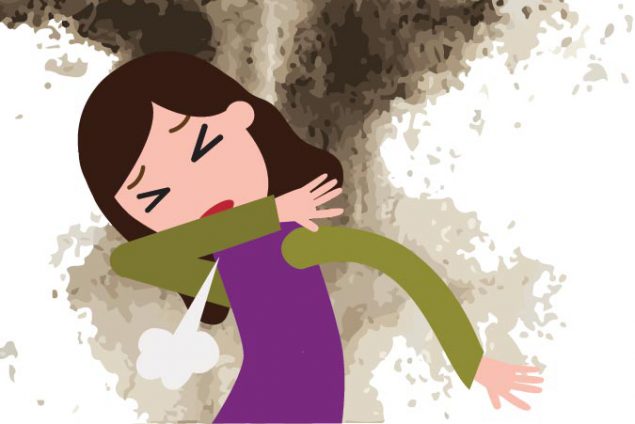Black fungus has become a possible hazard to the human population on a global scale. Black fungus, often referred to as mucormycosis in science, is brought on by a family of moulds that are typically present in soil, plants, and decomposing organic waste. While most healthy individuals are not at danger of contracting the virus, those with compromised immune systems, uncontrolled diabetes, and those who have used steroids or other immunosuppressive medications for an extended period of time are.
India has seen a substantial increase in instances of fungus as a result of the recent spike in COVID-19 cases. If neglected, the infection can have devastating effects and cause significant harm to the nose, eyes, and brain. It’s critical to comprehend fungus signs and to contact a doctor as soon as possible.
What is Black Fungus?
If left untreated, black fungus, a form of fungal infection, can result in major health issues. It is sometimes referred to as mucormycosis and is present in the environment, particularly in soil and decomposing organic materials like compost and leaves. Mucormycetes are a class of moulds that cause fungus.
Black fungus spores can infect the skin, sinuses, lungs, brain, and other organs when they enter the body. The virus is most likely to affect those whose immune systems are already compromised, such as those who have cancer or diabetes. However, it has been shown recently that even those who have recovered from COVID-19 are still at risk of getting fungus, most likely as a result of the post-infection compromised immune system.
When black fungus is present, it can lead to serious health issues like organ damage or, in extreme situations, death. Therefore, knowledge of fungus, its signs, and its possible risks is crucial.
How Does Fungus Spread?
A class of moulds known as mucormycetes, which are typically found in soil, plants, and decomposing organic materials, are the culprits behind black fungus. Cuts, scratches, or other skin injuries can allow it to enter the body. It can also affect the lungs and sinuses by infecting the body with the inhalation of spores from the environment, especially through the mouth or nose.
Black fungus can be especially dangerous to people with compromised immune systems. This includes persons who have just recovered from COVID-19 as well as those who have diabetes, cancer, HIV, and other diseases. A person may also be at risk of getting the illness if they are receiving immunosuppressive treatment, have had organ transplantation, or have pre-existing respiratory issues.
By practising excellent hygiene, such as routinely washing their hands and avoiding touching their faces with dirty hands, people can protect themselves from fungus. Additionally, it’s critical to maintain social seclusion practices and to wear a mask when in public. Seek medical assistance right once if you think you could have black fungus.
Early Symptoms of Black Fungus
Understanding the early symptoms of black fungus can encourage people to seek treatment right away, thereby avoiding serious issues. Depending on the degree of the illness, the symptoms might vary, however, the following are the most typical:
- Nasal congestion: Nasal discharge and soreness or swelling around the eyes or cheekbones are possible side effects of nasal congestion.
- Eye pain or redness: A black fungus infection can result in eye pain, redness, and swelling, as well as blurred or lost vision.
- Swelling of the face: A black fungus infection may cause swelling of the face, eyelids, or other parts of the body.
- Black patches on the skin: The skin surrounding the mouth or nose may develop black patches as the illness worsens.
- Fever: Low-grade fever, general malaise, and exhaustion can all be symptoms of fungus.
It’s crucial to get medical help immediately if you develop any of these symptoms. Early intervention can aid in preventing the infection’s spread and the development of more serious consequences.
Treatment and Prevention of Black Fungus
A severe ailment called fungus needs to be treated right away. It can quickly spread and seriously harm the body if untreated. Here are some actions you may take to stop the spread of black fungus:
- Maintaining good hygiene: Before touching your face or consuming anything, always thoroughly wash your hands with soap and water. Keep personal stuff like towels, toothbrushes, and razors to yourself.
- Be aware of your health: Seek emergency medical assistance if you suffer any fungus symptoms. In order to stop the infection from spreading, early treatment is essential.
- Manage underlying medical conditions: If you suffer from diabetes or another underlying medical condition, work closely with your doctor to control your symptoms and lower your risk of infection.
- As advised, use prescription medications: For the greatest results, follow your doctor’s instructions precisely when taking any medication given to treat fungus.
If you are told you have black fungus, your doctor will probably recommend antifungal medication and perhaps even surgery to remove the affected tissue. Hospitalisation may occasionally be required to keep an eye on the infection and offer supportive treatment.
Keep in mind that preventing black fungus is the best course of action. Take precautions to safeguard your health and wellness by being knowledgeable about the hazards and symptoms.
Staying Informed and Protected From Black Fungus
Knowing more about black fungus will help you stay educated and take precautions to safeguard yourself and others. Be mindful of the symptoms and, if required, seek medical help. Keep in mind that early detection and treatment are essential to recovery.
Consistently washing your hands with soap and water and refraining from touching your face with unwashed hands are two ways to ensure excellent hygiene. Additionally, stay away from lending out personal stuff like towels and razors.
Take extra steps to shield yourself from exposure to black fungus if you are in a high-risk group, such as people with impaired immune systems, diabetes, or COVID-19 patients receiving oxygen therapy. This might entail donning a face mask and keeping as far away from crowded locations as you can.
Conclusion
If left untreated, black fungus is a serious condition that might have negative effects. However, you may safeguard yourself and the people around you against potential infection with the correct information and safety measures. Keep in mind to practice proper hygiene, be educated, and get help if you suffer any symptoms.















